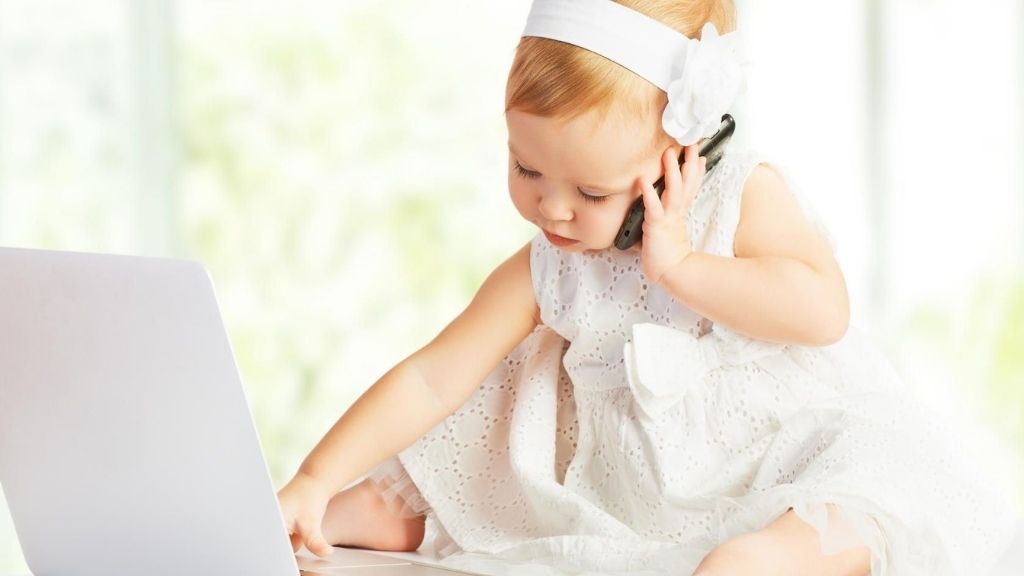
Table of Contents
There are a few ‘firsts’ in your baby’s life that you mustn’t miss — their very first word, her first laugh, and her first footsteps. Like most parents, you probably cannot wait until your child begins speaking.
So you must be wondering: when do infants begin to talk?
In reality, your child has been speaking to you since you first saw her. She has been displaying a variety of expressions, sobbing when upset, and grasping for items for a time.
However, you’re undoubtedly anxious for her linguistic abilities to advance.
When Do Babies Start To Talk?
When your infant begins to speak, they are showcasing their developing linguistic abilities. Even if you have no understanding of what they are expressing, ultimately genuine words will emerge from this nonsense. As they recall and repeat sounds, pause to consider what they want to say, and improve their ability to employ both verbal and nonverbal movements, children’s chatter also provides a window into their intellectual growth.
Babbling also has a social factor to it. Even before they can speak, your kid is observing you pick up on social and linguistic conventions. Babies watch how they respond to stimuli and engage in interaction with others by switching off at certain points. Through this, kids pick up new languages and emulate the verbal interactions of others.
When Do Babies Start Talking?
Between the ages of 9 and 14 months, babies begin to communicate or seek to express themselves through words that have meaning. But as soon as they are born, newborns begin to learn how to communicate, mostly through seeing and listening to you and other people.
So, when do babies start talking? Let us take a look at a timeline:
3 Months
Around three months old, they will begin to babble a collection of repetitive noises, such as “kaka,” “gaga,” or “baba.” They might even murmur “mama” or “dada,” but she won’t necessarily mean mom or dad just yet; they’re merely practicing her vocalizations.
6 Months
By the time he is 6 months old, your baby is beginning to understand that the assortment of noises they hear every day are actually words. They could even recognize some of them, including their name, the names of other people, and the names of things they are familiar with.
When they babble, they could also produce some noises themself and tie together a few vowels like “ah,” “eh,” and “oh.” It’s possible to see consonants like “m” and “b” as well.
9 Months
If you’re wondering, “when do babies start talking words?”, this is the time you must pay attention to.
Babies can grasp a few simple phrases like “no” and “bye-bye” around nine months. Additionally, they could start using a larger variety of consonant sounds and voice tones.
12 to 18 Months
Your child will probably be able to speak at least one word by the time he becomes one year old, such as “dada,” “mama,” or “oh no”. In addition, he could alter the tone of his utterances and attempt to repeat what he hears you say; all of this is beginning to sound like actual speech.
2 Years or Later
Babies may form brief sentences of two to four syllables, such as “Mommy bye-bye” or “me milk,” by the age of two. They are discovering that words may refer to both concrete things, like “cup,” and abstract concepts, like “my.”
By the time your child reaches the age of three, their vocabulary has significantly increased. They can use abstract and symbolic language, such as “now,” emotions, such as “sad,” and spatial notions, such as “in.”
Helping Your Baby How To Talk
At some point you might get impatient and think about when do babies start talking in sentences? Well, that totally depends on the child, but what you can do is help them take the first step.
Here are some ways you can help your little one:
1. Observe
Your infant could raise both arms to indicate that they want to be picked up, give you a toy to indicate that they want to play, or push food off of their plate to indicate that they are full.
In order to support these first, gestural efforts at infant conversation, smile, establish eye contact, and react.
2. Listen
Babies attempt to mimic the sounds that their parents make and to alter pitch and tone to correspond to the language that is being spoken around them.
Pay close attention to your infant’s cooing and chattering, then mimic such noises for the infant. Be gentle and give your child plenty of time to communicate with you.
3. Appreciation
Even the simplest or most perplexing efforts at baby speak should be greeted with a smile. Babies pick up on speaking power by observing how adults react to them.
4. Imitate
Children adore hearing their parents’ voices. Also, talking to children by parents encourages speech development. Babies will continue to try to speak as long as you talk to them in “baby talk” and use short, basic, but appropriate terms like “dog” when they say “daw,” for example.
5. Elaborate
If they are making noise or showing gestures, try to frame that into a sentence and ask them. For instance,
| What They Do | What You Could Say |
| Pointing to the table after they’ve had their food | Do you want another/ some more (whatever food they were having)? |
| Raising their hands up | Do you want me to pick you up? |
6. Speak Small Words Clearly
Speak slowly and clearly, concentrating on each word. Even while you don’t have to speak like a caveman around your infant all the time, slowing down as you go through a picture book or describing what you’re doing can assist your kids to understand and concentrate on specific words.
7. Be Patient
Keep attempting to comprehend what your infant is saying, even when you can’t. Ask whether what you think is being said is accurate by gently repeating it again. Continue to show your kid your affection so that she will feel appreciated for attempting to communicate.
8. Names, Not Pronouns
When addressing someone, wherever feasible, use their full name rather than a pronoun.
| What You Say? | What You Could Say? |
| This is my cup. | This is Dada’s cup. |
| Here is your hat. | Here is Liam’s hat. |
9. Let Them Lead
Playtime is a great opportunity to demonstrate that communication is a two-way game that involves talking and listening, leading and following.
Should You Be Worried When Your Baby Does Not Start Talking?
The range of what constitutes regular speech is rather broad. As early as seven months, your baby may begin to utilize sound words like “mi” for “milk” or “dat” for ”that”. Or it might take up to 18 months for your youngster to begin using words or word sounds.
Unbelievably, hearing a child’s first words at either end of the spectrum, or at any age in between, is as suitable. Every youngster grows at his or her own rate.
Seeing a Doctor
What follows “when do babies start talking?” is the query “When should I be concerned about my kid not talking?”
Keep an eye out for any indication that your kid is having a significant speech delay, and if you suspect a problem, consult your doctor. A speech delay can occur for a variety of reasons. But the sooner you identify a speech issue in your baby, the more time you’ll have to assist your kid to overcome it before they start school.
Every baby develops at his or her own rate, but if you are worried about how your kid is progressing, don’t wait to consult your physician.
When Do Babies Start Talking? FAQs
1. When do babies start talking clearly?
2. What is considered a late talker?
3. Is it normal for a 2-year-old not to talk?
Reviewed By:

Nimrat Sidhu - Pediatration
Dr. Nimrat S Sidhu is a practicing pediatrician for about 5 years now and holds an MD pediatrics degree. She was the topper of her batch, has always had a keen interest in her core medical field, and is specially trained for neonatal resuscitation.
She has published multiple research papers on pediatrics and is interested in topics like Neonatal care, skincare, baby growth, vaccination, growth, and development.
On behalf of the editorial team at Parenthoodbliss, we follow strict reporting guidelines and only use credible sources, along with peer-reviewed studies, academic research institutions, and highly respected health organizations. To learn about how we maintain content accurate and up-to-date by reading our medical review and editorial policy.
Join 1000+ Parents Who Get Our Weekly Bliss!

Get expert parenting tips, baby product guides, and wellness advice—delivered straight to your inbox. No spam, just real, research-backed support on your parenting journey



